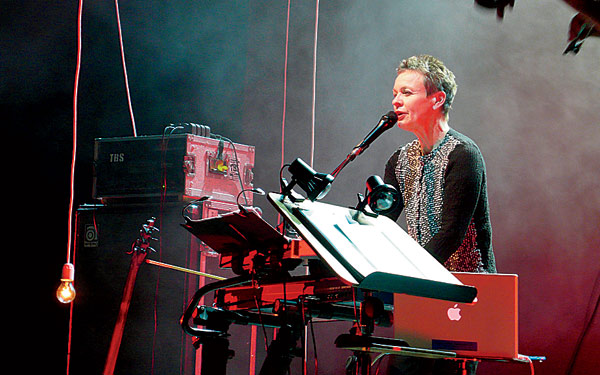
Anderson tones down the eccentricities and turns up the emotion in Homeland.
 |
Art rocker, spoken-word maven, and Glen Ellyn native Laurie Anderson blends strings, electronica, and technological theatrics in her latest work, Homeland, which she performs at the Harris Theater April 16th (205 E. Randolph Dr.; 312-334-7777). In it, Anderson explores America’s obsession with security and revisits other themes (war, nationalism) that gained her recognition more than 25 years ago.
Q: You’re a Midwesterner. How would you advise a typical Chicagoan to approach your work?
A: It’s just some songs and stories. It’s really simple, and it always has been. It’s not like they have to have a big structure to evaluate it. Some of the songs are more political than others, and some are really personal. I never did try to make stuff that was likable for everyone. That’s why I’m in this sort of bin of “experimental artist.”
Q: How would you compare Homeland to United States, your eight-hour-long magnum opus from 1983?
A: Homeland is a lot more complex than United States. That’s also because United States was done in a more telegraphic style, with shorter bursts of lots of imagery. You couldn’t really make a story that had a lot of twists and turns, which I love. What you can do in a situation like this (where you’re not using a lot of those big pictures) is have more fun with language.
Q: You performed parts of Homeland in Europe last summer. What was the response?
A: I get a lot of stuff like, “Are you allowed to say that?” They have a really extreme picture of what is going on here. They think we’re political prisoners or something. And I tell them we can do what we like. That doesn’t mean that anybody’s listening, but still, at this moment, there is free speech. That really surprised me that they think that Americans are muzzled.
Q: Why do you think you’ve found greater commercial success in Europe?
A: It’s the same reason that jazz guys went over there in the 1940s. It’s just a more open scene in a million ways. I think people really get cheated [in the United States] because they have to stay in their [marketing] niche.
Q: Last year, Nonesuch Records re-released your breakthrough hit, Big Science, in celebration of your 60th birthday. How’s life at 60?
A: It’s fantastic. You know, I thought, Whoa, you’re almost dead by then! But . . . I don’t have to go to clubs every night, and that’s really a relief! When I dress up I don’t have to try as hard as I used to because, hey, I look 60. I like it, too, because it reminds you that time is so short, so it makes you have a much better time. It gives you a certain amount of clarity, and I’m really grateful for that. Any little glimpse of clarity is appreciated because, well, it’s pretty murky otherwise.
Photography: Courtesy of Laurie Anderson


